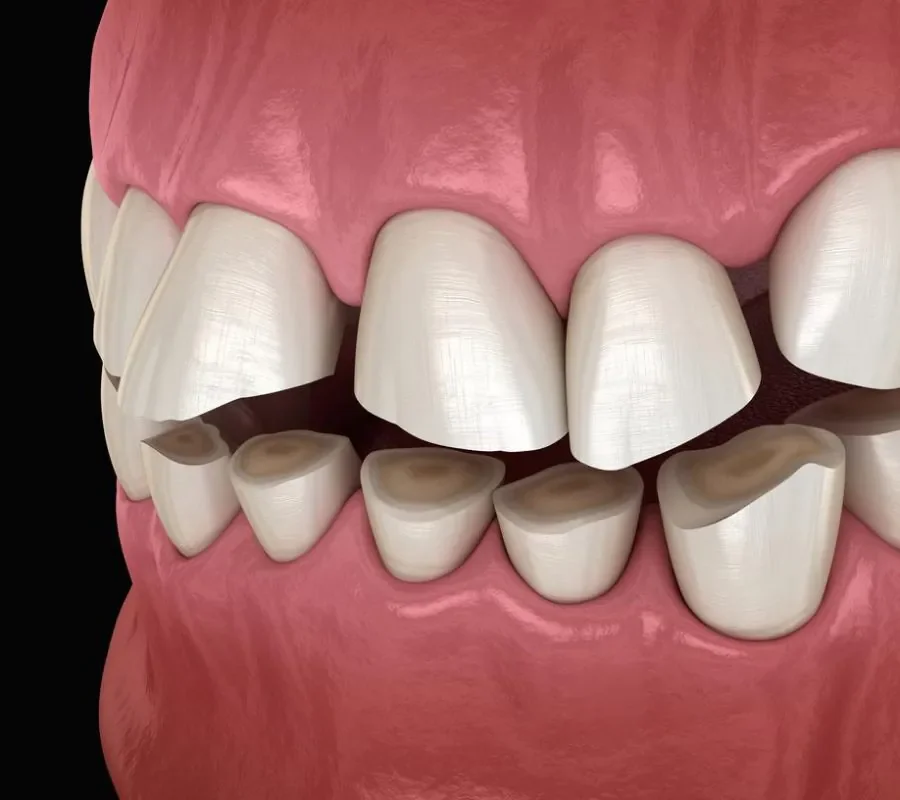As Principal Dentist at tooth dental care in Waterloo, London, I often see patients who don’t realise just how much damage teeth grinding, also called bruxism, can cause. Many people grind their teeth in their sleep without even knowing it, while others clench their jaws during the day when stressed or concentrating.
Although it may seem harmless, grinding your teeth can have serious long-term effects on your oral health. In this blog, I’ll explain the risks, the warning signs to look out for, and the treatments available to protect your smile.
What is teeth grinding?
Teeth grinding, or bruxism, is when you unconsciously clench, grind, or gnash (bringing your top and bottom teeth together) your teeth. Most patients assume that grinding only happens at night, but it can also occur during the day. While occasional grinding may not be a concern, regular and persistent bruxism can lead to pain, dental damage, and other health issues if left untreated.
Why do people grind their teeth?
There isn’t always one clear cause, but common factors include:
Stress and anxiety – tension often leads to clenching or grinding.
Sleep disorders – such as sleep apnoea.
Bite problems – misaligned teeth or an uneven bite can trigger grinding.
Lifestyle habits – excess caffeine, alcohol, or smoking can also make bruxism worse.
The risks of ignoring teeth grinding
If left untreated, bruxism can cause:
Tooth wear and fractures – grinding can wear down enamel, chip teeth, or even break them.
Jaw pain and stiffness – clenching puts pressure on the jaw muscles and joints.
Headaches and earaches – tension from grinding often radiates into other areas of the head.
Gum recession and sensitivity – enamel loss can make teeth more prone to sensitivity.
Expensive dental work – untreated damage may eventually require crowns, root canals, or even tooth replacement.
Signs you may be grinding your teeth
Some people only find out they grind their teeth when their dentist points out the damage. Look out for these warning signs:
Worn, flat, or chipped teeth
Jaw pain when you wake up
Morning headaches
Tight or tired facial muscles
Increased tooth sensitivity
Partners or family hearing grinding sounds at night
Treatments for bruxism
The good news is that teeth grinding can be managed effectively. At tooth dental care, we offer tailored treatments depending on your needs:
Custom-made night guards – a protective mouthguard worn at night to prevent damage.
The cost of a nightguard is only £180 at time of writing.
Bite adjustment – if grinding is linked to misaligned teeth, correcting the bite can help.
Stress management techniques – addressing underlying stress often reduces grinding.
Lifestyle changes – cutting back on caffeine, alcohol, and smoking can improve symptoms.
Regular monitoring – ongoing dental check-ups ensure any damage is spotted early.
Injections for bruxism – in some cases, small doses of anti-wrinkle (muscle relaxants) can be used to relax the overactive jaw muscles that cause grinding. This reduces pressure on the teeth and jaw, helping to ease pain and prevent further damage.
Protect your smile at tooth dental care in London
Grinding your teeth may feel like a small habit, but the long-term risks are significant if you don’t take action. At tooth dental care in Waterloo, London, we are committed to helping patients protect their teeth with preventative care and personalised treatment.
If you think you might be grinding your teeth—or you’ve noticed jaw pain, headaches, or signs of wear—don’t ignore it. Book an appointment with our friendly team today and let us help you protect your smile for the future. Booking is super easy at tooth, just click here or press any of the buttons below and our lovely dental team will get back to you straight away. New Patient Dental Exams are only £45 for up to 30 minutes and this includes the opportunity to discuss and review and grinding issues you may be having.
Don’t let grinding wear away your smile - we can help!
Dr. Anna x

